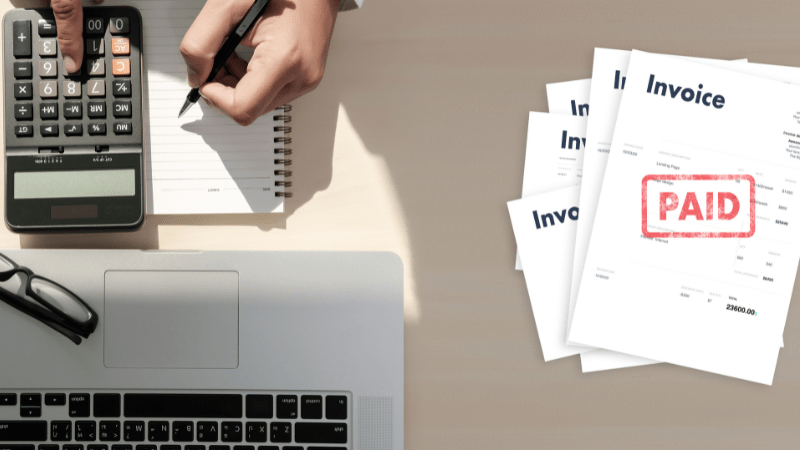Categories
8 Advantages and Disadvantages of Invoice Discounting (and Is It Right for Your Business?)

There are clear advantages and disadvantages to invoice discounting as a form of business finance. If your business needs access to funds, it’s important to understand these pros and cons so you make the best decision on the type of finance you pursue.
But what exactly does invoice discounting do for you, and is it right for your business?
Let’s look in-depth at the main advantages and disadvantages of invoice discounting.
What Is Invoice Discounting (and How Does It Work?)
Invoice discounting is a finance solution for businesses that releases funds which are secured against unpaid client invoices. An invoice discounting lender will typically allow you to access between 75-90% of the value of these unpaid invoices. You gain access to the funds within days, rather than waiting weeks or months.
The loan is paid back when your clients pay the outstanding invoices.
There are two types of invoice discounting:
- Whole turnover invoice discounting: A business sells all (or a large number) of its eligible unpaid invoices. This can become a line of credit facility where the business regularly sells its invoices.
- Selective invoice discounting: A business sells specific invoices, rather than the whole accounts receivable ledger. This is a flexible option for businesses who need fast access to cash flow over a short-term period.

Here’s How Invoice Discounting Works
The invoice discounting process typically follows these six simple steps:
- You provide goods or services to clients
- You invoice your clients for what you sold, asking for payment within a certain period
- You decide to sell some (or all) of your unpaid invoices to an invoice discounting company
- The invoice discounting company verifies the invoices and releases the funds to you
- Your clients pay the outstanding invoices according to the payment terms they agreed with you
- When you receive payment from your clients, you repay the loan plus any agreed fees and interest.
Why Businesses Need Invoice Discounting
The standard B2B payment model for products and services involves issuing invoices which are then fulfilled 30, 60, or even 90 days later. This formal request for payment has valid legal and accounting reasons behind it – but it may leave your business in a precarious position.
Businesses rich in cash flow capital can comfortably wait for payment. However, growing companies do not have such a luxury. As the money mounts up in your accounts receivable ledger, salaries need to be paid, equipment and supplies obtained, and opportunities may be missed.
That’s where invoice discounting comes into play. It’s one of the two main types of invoice finance available for companies to leverage their accounts receivable and release funds early.
Invoice discounting is particularly helpful in scenarios where your business needs to:
- Hire temporary staff over a busy period
- Purchase necessary stock or raw materials
- Make it through a tough trading period
- Invest for the future
Looking for more information? Watch our short video below to learn about invoice finance in more detail.
4 Advantages of Invoice Discounting
Many businesses struggle with cash flow at one point or another. Invoice discounting is a great way to release cash, and there are a few other benefits worth keeping in mind.
Here’s a breakdown of the key advantages of invoice discounting as a finance solution for your business.
1. Release Accounts Receivable Funds Early
Cash flow is essential to the health of your business. And the biggest advantage of invoice discounting is that it offers fast access to funds when you need it.
When you know you have access to finance, it allows you (and your business) to move with confidence. You know that you can plan for growth, bid on contracts, and run the day-to-day operations of your business without waiting on unpaid invoices.
2. Access to Flexible Finance
Flexibility comes with either type of invoice discounting. An invoice discounting package can be tailored to fit your company’s precise needs.
With full turnover invoice discounting, it comes in the form of a rolling line of credit to your business. You get substantial flexibility once it has been set up, as you’ll be able to discount future invoices with no long waits for the administrative process. You can simply run your business as if all your future invoices are set to zero-day terms.
Similarly, selective invoice discounting is easily repeatable. Once you use the facility, future instances are more easily obtained. This provides your business with a similar level of ongoing flexibility without leveraging your entire accounts receivable.
3. Remain Confidential with Invoice Discounting
Invoice discounting is completely private. This means that your business can leverage finance against your outstanding client invoices without your clients being notified.
This is extremely important for protecting your business’ reputation during the payment process, which is a sensitive area. From your client’s point of view, they will simply be paying a normal invoice to you – completely unaware that any credit facility has been taken out.
4. Capitalise on New Opportunities
Freeing up your finances early provides you with capital you can use for other purposes. Invoice discounting allows you to take immediate action when a new opportunity develops. This means your business growth is not constrained by locked funds in your accounts receivable ledger.
Example: Let’s say the owner of a landscaping business is presented with the opportunity to bid on a large contract. Winning the contract would be a significant step forward for the business, allowing them to grow and potentially secure larger contracts in future too.
But to fulfil the contract, the business owner knows she would need to take on additional staff. She could only afford to do that if a number of unpaid invoices from previous work were all fulfilled, or if the large contract is fulfilled and paid. So, instead she looks into invoice discounting as a solution.
This allows her to access to funds from the unpaid invoices and use that finance to hire the required resources to take on the new large contract.
4 Disadvantages of Invoice Discounting
If your business it considering invoice discounting as a way of improving cash flow, it could work well on a temporary or ongoing basis. But it’s important to know the ins and outs of how it works.
Here are the key disadvantages you need to be aware of when looking at invoice discounting as a finance solution.
1. Invoice Discounting Costs
The biggest strike against invoice discounting is that it will cost you. Exactly how much that cost is will differ depending on the following factors:
- Whether you choose whole turnover or selective invoice discounting
- The size of your company turnover
- The value of the invoices to be discounted
- The length of the loan term
- Your business sector
- External factors (such as the current Bank of England base rate)
Whole turnover invoice discounting is treated as an ongoing line of credit, coming with an administration fee as well as a discounting fee based on the loan size. The total amount of credit available to you will typically represent between 75% and 90% of your accounts receivable ledger.
Selective invoice discounting has a single fee that is calculated based on the size of the invoices to be discounted. This fee is typically between 3% and 5% of the invoice.
Weighing the advantage of gaining immediate access to funds against the cost of invoice discounting is the main trade-off when considering invoice finance.
2. Invoice Discounting Penalties
While these scenarios will hopefully never play out, it’s important to understand the type of penalties associated with invoice discounting in certain situations.
For example, if an invoice is discounted and is underpaid by a client at a later date, your business will likely owe the difference as well as any fees and interest.
Depending on the specific agreement you have in place, you may also be found in breach of the invoice discounting agreement and suffer a negative impact on your business’ credit rating.
Underpayment from a client could happen for several reasons, such as:
- A discrepancy in the original invoice (incorrect pricing or quantity)
- A disputed invoice (quality issues or services not performed)
- An incorrect calculation (of a discount or promotional offer)
3. Reliance on Discounting Invoices
Like other ongoing lines of credit, invoice discounting can become a little too convenient.
Once you are settled into the habit of paying your invoice discounting fees, you may become used to the idea of accessing invoice funds without delay. This can make it difficult to release yourself from the model.
This can lead to longer periods of time when you are paying ongoing administration and discounting fees that you no longer need. Especially as your company grows and realises the cash flow that would allow it to comfortably work within standard invoice terms.
You also run the risk of making your business reliant on the finance. For example, it’s easy to fall into a patten of using an invoice discounting facility to pay for necessary materials, which then run out and you need to take on more borrowing to pay for the next batch of materials, and so on.
4. A Bias for Larger Enterprises
Invoice discounting is a tool that is significantly easier (and more cost-effective) for larger companies. There are comparatively few lenders willing to offer invoice discounting for smaller businesses, making it sometimes out of reach.
This is because smaller businesses often have weaker credit profiles and lower turnovers, which increases the perceived risk being taken on by the lender. It doesn’t make invoice discounting impossible, but a small business may have to pass stricter eligibility requirements and accept higher fees or interest rates.
In these situations, it may be more advantageous for smaller businesses to consider alternative financing options.
Alternatives to Invoice Discounting

Always take stock of your options. You may have heard about invoice discounting or even had it recommended to you, but there may be more suitable ways of accessing the finance you need.
Let’s take a look at the alternatives to invoice discounting. All of these options could help you with ongoing cash flow and delays with invoice payments.
We recommend discussing your situation with an independent business finance broker to get professional advice before committing to finance solution.
Invoice Factoring
Invoice factoring allows you to sell outstanding invoices to a third party at a small discount. This provides immediate access to cash locked up in unpaid invoices. While more expensive than other alternatives, an invoice factoring facility can provide critical working capital when needed.
- A one-off loan or line of credit facility is set up, you can then sell invoices when needed for up to 90% of their value
- Interest ranges from 0.5% to 7% depending on several factors, and there is typically a service fee and credit protection charge
- There is no confidentiality with invoice factoring – your client will know you have sold the invoice
- The invoice factoring company becomes the credit controller and will chase any late payments
Merchant Cash Advance
Invoice discounting and invoice factoring are finance options primarily designed for business-to-business (B2B) companies. If you deal direct to the customer (B2C) using frequent card transactions, then a merchant cash advance could offer a better solution.
- A cash advance of up to 250% of your monthly card sales, as long as you can demonstrate a minimum level of card sales (typically £2500 to £5000 per month)
- Repayments automatically adjust according to sales volume, as the provider collects a fixed percentage of card transactions
- Designed to suit businesses with frequent card transactions such as restaurants, bars, hotels, and shops
- MCA providers use a factor rate to show the cost of the advance (typically 1.1 to 1.5) – if your factor rate is 1.5, you will repay 1.5 times the amount received
Unsecured Business Loans
Other solutions such as unsecured business loans or asset financing could offer similar help with cash flow. Depending on your specific set of circumstances, it may be possible to get a short-term loan that is more favourable for your business.
- A straightforward loan that provides a simple route to short-term finance, typically with fewer fees but also smaller loan amounts
- The amount available to you will depend on traditional risk factors such as time in business, turnover, profit margin, and credit score
- The loan will have a standard monthly repayment structure, with clearly defined interest that is applied on a monthly or annual basis
- Unsecured business loans are not tied to any assets for security, which results in higher interest rates than secured business loans
Business Credit Cards and Overdraft Facilities
Short term credit solutions such as overdrafts and credit cards can be used in place of invoice discounting. If well managed, these other lines of credit can be less expensive, though a reliance on them over a longer term can become considerably more costly.
- Business credit cards often come with enticement bonuses and rewards, with increasing credit limits for those who manage them well
- Credit cards are typically best suited for smaller business expenses, which are easy to pay off each month and help your business build its credit score
- Overdraft facilities are meant to be used as a safety net to ensure that a temporary lack of funds does not stop a necessary payment
- Business account overdrafts can be adjusted or removed at short notice if the bank perceives that the facility is being abused
Find the Best Invoice Discounting Option with Clifton Private Finance
At Clifton Private Finance, we have a team of invoice finance brokers ready to help your business get swift access to the funds it needs. We can talk through your needs and circumstances to find the best solution, whether that’s invoice discounting or an alternative form of finance.
Our dedicated team specialises in securing competitive invoice finance options, providing you with access to:
- Competitive rates that lead the market
- Rapid funding – receive finance within 5 to 7 days
- Access to a network of specialist lenders
- Independent expert advice and professional service
Talk to us about the best option for your business. Call us at 0203 880 8890 or book a free consultation below.
Invoice Discounting FAQs
Is Invoice Discounting a Good Idea?
Invoice discounting benefits businesses with regular invoicing and dependable clients. It unlocks funds tied to unpaid invoices, improving cash flow for day-to-day operations or expansion. However, you need to consider costs, eligibility factors, and future cash flow implications before choosing this financing option.
How Much Does Invoice Discounting Cost?
Invoice discounting costs vary based on business size, customer creditworthiness, and terms from the provider. Fees typically include a discount charge and a service fee. To decide, compare quotes from different providers, understanding all associated costs.
Is Invoice Discounting Cheaper Than Factoring?
Invoice discounting is often cheaper than invoice factoring due to retained control over the sales ledger and credit. Factoring includes credit management, making it relatively more expensive. Costs depend on business needs and negotiated terms with the financing provider.
Do Banks Do Invoice Discounting?
Yes, many banks offer invoice discounting with specific eligibility criteria. Non-bank financial institutions and specialist finance companies also provide options, offering a broader range for businesses seeking this type of financing.
Is Invoice Discounting Regulated by the FCA?
Invoice discounting itself isn't directly regulated by the FCA. However, you should ensure any provider you consider is reputable and regulated. Check the FCA register for compliance. Regulatory requirements may change, so verify the current status with the latest information available.









